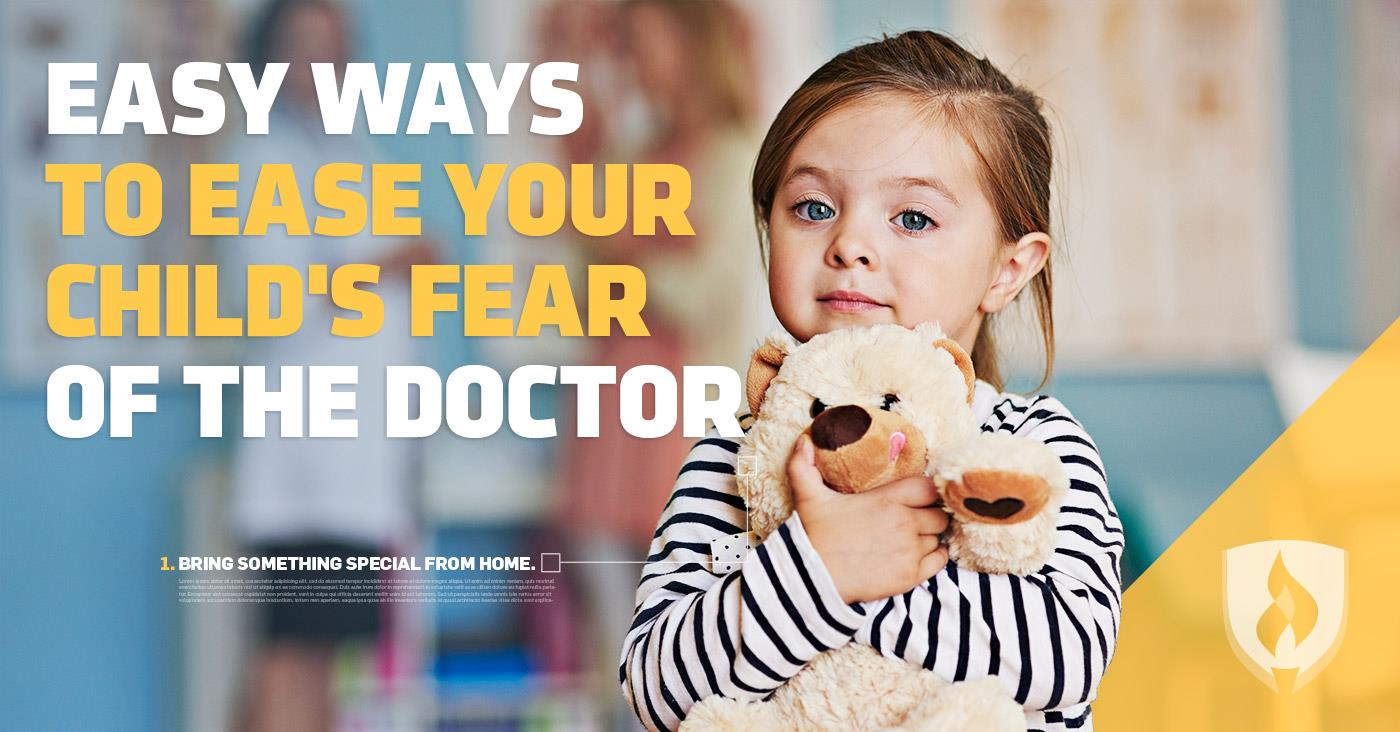
The pediatrician’s office can feel like a home away from home for many families. From birth to age 10, your child will most likely have at least 20 medical checkups, and that doesn’t include visits for illnesses or injuries. Unfortunately, the combination of an unfamiliar environment and anxiety about pain can create a fear of the doctor in many children, starting as early as their toddler years.
Since doctor’s visits are a vital aspect of supporting our children’s health and wellness, it’s important that we make them as comfortable as possible for our kids. Consider these nine tried-and-true tips from experts in the medical field next time you schedule an appointment for your child.
Get Your Nursing School Questions Answered at a Nursing Information Session
How to overcome your child’s fear of the doctor
1. Bring something special from home
Jill Whitney, a marriage and family therapist at Green Tree Professional Counseling, said bringing something from home might make doctor’s office visits less stressful for little ones, adding a touch of comfort to an otherwise intimidating environment. A stuffed animal or blanket might be a great place to start.
“We always brought my kids’ special stuffed animals on doctor visits and introduced them to the doctor,” she said. Connecting something familiar to an unfamiliar place could be just the trick for acclimating fearful kids to a new environment.
2. Be honest
Whitney also said it’s important to find a healthy balance of honesty and helpful information to prepare your child for a visit to the doctor. “Acknowledge that going to the doctor isn’t fun — but it is important. Say things like, ‘I know, it’s kind of yucky to get poked and prodded, and I don’t like getting shots either. But I go to the doctor because it’s important to stay healthy, and that’s why I take you. And Dr. Smith is really pretty nice. We can ask him questions about our bodies.’” Conversations like this one can help ensure realistic expectations for your kids and mentally prepare them for upcoming visits.
3. Talk about those shots
There’s always the big question of whether a shot will be involved in a medical visit, and older kids will often ask. Whitney said it’s crucial to prepare kids ahead of time for vaccinations so they know just what to expect at every appointment.
“My kids were always most worried about whether they’d be getting a shot. I learned to call before the appointment to find out whether they’d be getting any. Then I could reassure them when a given appointment didn’t involve needles,” she said. Preparing in this way could be a helpful tool in taking the edge off your little one’s anxiety.
4. Prepare them as much as possible
Dr. Danielle Wiese, a pediatrician at Riley Children’s Health, encourages parents to prepare their children by letting them know what to expect — especially for potentially uncomfortable moments.
“With children who are no longer wearing diapers, it seems strange for a grownup to look at their private parts. Have a discussion about why doctors need to check all of our body parts, even private ones. I usually tell the child, ‘It’s okay for me to check because I’m a doctor and your parents say it’s okay,’” she said. “If the child is prepared for this before the visit, it is less of a shock for them.”
5. Bring a distraction
Dr. Charles Shubin is a pediatrician at Mercy Medical Center in Baltimore. He said distractions are usually key in keeping his young patients happy before and during appointments: “Electronic distraction is now the usual way kids I see are distracted, and rather effectively, too.” If you have them, try bringing an iPad or another electronic activity to distract your child in the waiting room so they don’t spend time worrying about their appointment.
6. Help them engage with the provider
At a certain age, parents stop going into the exam room with their kids, so it’s important to prepare older children for this milestone. Whitney said, “It’s helpful to model asking questions — taking an active role in one’s healthcare. If my kids wondered about something, I’d nudge them to ask it, even though they felt shy at first.”
7. Choose a friendly doctor
The provider ultimately sets the tone for the entire office visit, so choosing a doctor who makes your kids feel comfortable is key. Not sure where to start? Ask friends or family members with children which clinic they go to and which pediatrician they see, or read reviews and ratings of doctors online. If you’re unsatisfied with the care you’re receiving from a specific physician, don’t be afraid to try a new one.
8. Be a good role model
Fear of the doctor isn’t limited to just kids — many adults get nervous about appointments, too. Dr. Jennifer Dean, a dentist at Rancho Santa Fe Cosmetic & Family Dentistry, says, “As a dentist, there’s unfortunately a lot of fear of us out there. The children most afraid typically have phobic parents, and that fear is passed to their children in how they speak about and handle the situation when they need to see a dentist.”
Candi Wingate, founder of Care4Hire, says letting your kids see you confident in a doctor’s office might help acclimate them to their own visit. “Take your toddler with you to your own similar appointment so they can see that there’s no reason for fear.”
9. Practice at home
Anything you can do to make the doctor’s office more familiar will benefit your child’s visit, so try practicing at home a few days before the appointment. Dr. Wiese says, “The first thing we do when children step into the office is weigh them. This is a significant source of worry for many kids who don't like to stand on the scale by themselves. If you have a scale at home, let your child practice on it before you come so they know what to expect.”
Aaron Braun, Medical Director of Signature Care Emergency Center suggests a book about the doctor’s office or toy doctor’s kit to help make the medical world a little more familiar.
A parent who understands healthcare
Keeping a close eye on your child’s health is no easy task. The medical world can be hard enough to keep on your radar, even before you’ve factored in your child’s fear of the doctor. But if you are already researching how to tackle this issue, you are already ahead of the curve.
As you can see, parenting and health are more connected than you might have thought. In fact, parenting develops a strong skillset for work in healthcare. Learn about the impressive skills parents and nurses have in common in our article: 6 Nursing Qualities You’ve Already Mastered as a Mom.
RELATED ARTICLES:




